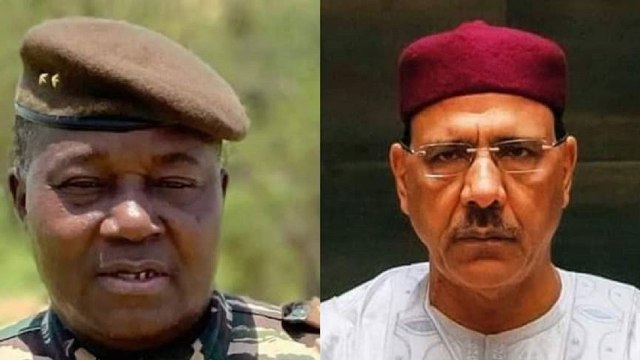Algeria and Egypt have joined the league of countries, organisations and individuals opposed to military intervention in Niger Republic.
Recall that Russia, Burkina Faso, Guinea and Mali have kicked against any military intervention in Niger to restore President Mohamed Bazoum who was toppled on July 26 in a coup led by General Abdourahmane Tchiani.
Oppositions to military option have also come from prominent individuals and groups in Nigeria, including the National Supreme Council for Islamic Affairs (NSCIA), Jama’atu Nasril Islam (JNI), Catholic Bishops Conference of Nigeria (CBCN), Christian Association of Nigeria, (CAN), Arewa Consultative Forum (ACF), and Northern Elders’ Forum (NEF), among others.
Algeria and Egypt, for their part, believe that dialogue remains the best option to resolve the impasse in Niger, stressing that any military operation in that country could create problems for Nigeria, being its closest neighbour.
Consequently, the Algerian foreign minister, Ahmed Attaf, has begun a tour of Nigeria, Benin Republic and Ghana to espouse a no-military-action of his home government.
Ataff who kicked off his tour yesterday would also hold talks with foreign affairs ministers in ECOWAS countries.
AFP reports that the minister is set to hold “consultations on the crisis in Niger and ways of dealing with it” with his counterparts in the West African countries, which form part of the Economic Community of West African States (ECOWAS).
Algeria, which shares a 1,000-kilometre (600-mile) long land border with Niger, had previously warned against a military solution, which Tebboune said would be “a direct threat” to his North African country.
He said: “There will be no solution without us (Algeria). We are the first people affected.”
Algeria also shares borders with Libya and Mali, both in the throes of years-long conflicts.
For its part, Egypt said there is the need for talks to peacefully resolve Niger crisis.
Egyptian foreign ministry spokesman, Ahmed Abu Zeid, reaffirmed “Egypt’s support for all efforts to resolve the crisis in a way that preserves Niger’s democratic system, sovereignty and stability and prevents any escalation that could destabilize the region.
“Egypt stresses the importance of maintaining dialogue to advance a peaceful solution to the crisis in Niger that would guarantee the preservation of the security and stability of the country and the brotherly people.”
Meanwhile, the United Kingdom’s minister of state for the armed forces, James Heappey, has applauded the efforts of ECOWAS to restore democratic rule in Niger.
Heappey spoke yesterday after a meeting with defence and military chiefs in Nigeria to discuss the political situation in Niger.
The UK minister met with Nigeria’s chief of defence staff, General Christopher Musa; chief of army staff, Lt-General Taoreed Lagbaja; minister of defence, Abubakar Badaru; and minister of state for defence, Bello Matawalle.
Heappey also met with president of the ECOWAS commission, Omar Touray, and assured him that the UK would support the organisation to ensure that constitutional order returned to Niger.
“The UK supports ECOWAS in calling for the peaceful restoration of constitutional order and democracy in Niger and we’ll work with both ECOWAS and our partners across West Africa to support them in that aim,” Heappey said.
He added that the UK recognised Nigeria’s diplomatic mediation efforts to peacefully restore democracy in its northern neighbour.
“The UK and Nigerian armed forces have a longstanding partnership through which we continue to tackle violent extremism and other security threats in West Africa and the Gulf of Guinea.
“We stand with ECOWAS in condemnation of the illegal detention of President Mohamed Bazoum, his family, and members of the government, as well as the unacceptable conditions under which they are being held, and call for their immediate release,” he added.
The UK government also called for the immediate release of ousted Bazoum.
A senior communications officer at the British High Commission, Atinuke Akande-Alegbe, made the call in a statement.
“We stand with ECOWAS in condemnation of the illegal detention of President Mohamed Bazoum, his family, and members of the government, as well as the unacceptable conditions under which they are being held, and call for their immediate release,” the statement said.
It added that the UK recognised Nigeria’s diplomatic efforts to restore democracy in Niger, through its membership of ECOWAS, and condemned the coup against Niger’s elected leadership.
It also recalled Heappey’s meeting with Nigerian defence leaders and military chiefs to discuss the situation in Niger.
He also met with the President of the Economic Community of West African States, ECOWAS, Commission, where he reiterated the UK’s support for ECOWAS’ ongoing diplomatic efforts to ensure a peaceful return to democracy in Niger.
Meanwhile, United Nations said the destabilisation of Niger Republic would undoubtedly have consequences on Libya, and vice versa.
UN special envoy, Abdoulaye Bathily, told the U.N. Security Council yesterday that Libya’s border with Sudan had been open to armed groups, mercenaries and gang leaders dealing in illegal migration, illegal mining, drug trafficking and other criminal activities.
For Niger, Bathily said, like other countries in Africa’s Sahel region, it had been affected by the crisis in Libya, as some Nigeriens have joined mercenaries in Libya, with armed elements in Niger active along the border.
He fears this could spread to other countries bordering Niger, should the situation in the country escalates.






















































